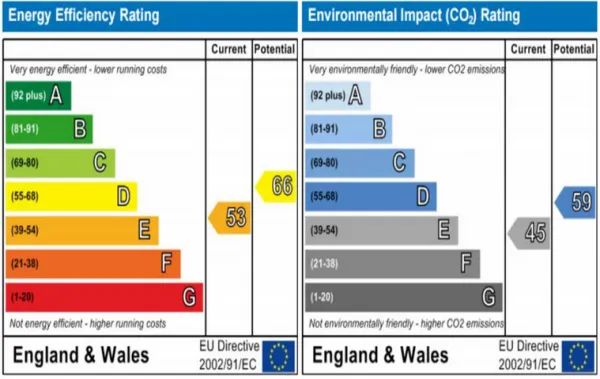Regularly referred to as an EPC, the Energy Performance Certificate was introduced by the UK government in an attempt to undertake periodic audit of the UK’s built environment and to assess its energy efficiency and nudge/require* property owners to improve the energy efficiency of their property.
A property owner must have a valid EPC whenever a property is built, sold or let.
An Energy Performance Certificate contains:
- information about a property’s energy use and typical energy costs
- recommendations about how to reduce energy use and save money
- An EPC gives a property an energy efficiency rating from A (most efficient) to G (least efficient) and is valid for 10 years.

At present, the following buildings do not require an EPC:
- Places of worship
- Temporary buildings that will be used for less than 2 years
- Stand-alone buildings with total useful floor space of less than 50 square metres
- Industrial sites, workshops and non-residential agricultural buildings that don’t use a lot of energy
- Some buildings that are due to be demolished
- Holiday accommodation that’s rented out for less than 4 months a year or is let under a licence to occupy
- Listed buildings - you should get advice from your local authority conservation officer if the work would alter the building’s character
- Residential buildings intended to be used less than 4 months a year
- Unsafe properties
*Current regulations relating to EPCs include prohibition of the renting of property that does not have an energy rating of band E or better. Failure to comply with these regulations can result in significant fines of up to £5,000.
Related article:
Recent posts
Best UK Mortgage Rates this Week
Yesterday

Here are the lowest fixed mortgage rates of the week, available to first-time buyers, home movers, buy-to-let, and those remortgaging.
Call us for more information: 01628 507477 or email: team@mortgagerequired.com.

Nationwide is the first lender to allow mortgage deeds to be signed electronically and without the need for a witness.

‘My First Mortgage’ from major high-street lender Santander is specifically for those wanting to buy their first property. It allows first-time buyers to purchase 98% of the property’s value. However, certain criteria must be met to be eligible.

Maidenhead, Berkshire – 26th January 2026 – Dedicated independent mortgage experts, Mortgage Required, are delighted to have acquired fellow experienced brokerage, Y-Not Finance.
The acquisition connects two well-respected brokerages, both with a wealth of experience and shared values, to continue providing the best advice on all aspects of the mortgage market.

As part of the UK government’s plans to change the leasehold system to help families struggling with unaffordable ground rent costs.
The Prime Minister announced this morning (27 January) that ground rents will be capped at £250 per year, reverting to a peppercorn rate after 40 years.

Additional borrowing, also known as a further advance, is when you borrow more money on your existing mortgage for a specific reason agreed with your lender.
Here are five of the most common reasons for additional borrowing.
UK Housing Market Round-Up: 2025
30 Dec 2025

Property search site Zoopla has estimated that the UK housing market will end 2025 with approximately 1.15 million completed sales – 4.5% more than the previous year.
Take a look at the 2025 summary of the UK housing market.
Buying in the New Year
29 Dec 2025

If buying your first property, or moving home, is on your to-do list this year, the new year can be a great time to take this big step. In this short blog, we look at what you need to consider as you plan and prepare for your home-buying journey.



















